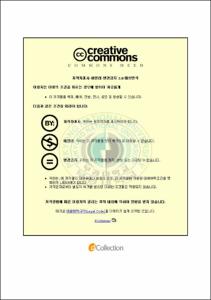한국 현대 생태시에 나타난 노장사상 연구
- Alternative Title
- A Taoism Study of Korean Modern Eco-poetry
- Abstract
- This study is purpose to identify the Taoism presented in the modern Korean eco-poetry. The conventional studies on eco-poetry have been focused on matters about using the term of "eco-poetry", the boundaries of eco-poetry, and the classification of contents in works. However identifying the world view-especially Taoism-contained in individual eco-poems has been excluded. The reason why studies on world views contained in the eco-poetry is needed is that it provides the foundation of the broad and correct understanding of the modern Korean eco-poetry.
Today it is told as the environment pollution and the existence of Human Beings in the future that the problem of the whole earth begins to solve. In a way of thinking centered on Human Being recently Nature becomes objective and also Human Being and Nature are separated each other. As a counterproposal to solve the problem a great variety of fields of learning on the foundation of the ecology are studying.
The introduction deals with the idea and boundaries of the modern Korean eco-poetry. Considering matters about the term of "eco-poetry" and its idea as settled, the author epitomized them.
Conclusion Ⅱ deals with the analysis on the Taoism. Tao(道) of the Taoism means 'Wu-Wei'(無爲). namely, Taoism proposes the nature view leaving nature as it is, with the appearance of Tao. In this study, the author considered dividing the Taoism into two-- Lao-tzu thoughts and Chuang-tzu thoughts. The thoughts of Lao-tzu is to do nothing artificial to nature, to make the size of nation and its people smaller. The thoughts of Chuang-tzu is an effort to meet the whole world without any barriers to be the one and to realize the harmonious co-existence.
Conclusion Ⅲ deals with eco-poetry based on the Taoism. The eco-poems based on Lao-tzu thoughts pursuit pro-environmental and disinterested life. This eco-poems shows that all organisms in the world follow their own true characters to live artlessly, freely and equally without covetousness. The result of the analysis indicate that most of the eco-poems written by Jung Hyun-Jong, Lee Sung-Sun, Jung Ho-Seung, Kim Gi-Ha, Go Jin-Ha, and Ra Hee-Duk etc. And the eco-poems based on Chuang-tzu thoughts pursuit giving life to deaths, unselfish lives, and the principle of life circulation and coexistence. The result of the analysis indicate that most of the eco-poems written by Lee Hyung-Gi, Jung Jin-Kyu, Jang Suk-Nam, and Oh Se-Yiung etc.
In summary, eco-poetry based on the Taoism shows communication between human beings and the universe, perfect union between people and nature, and proper ecology awareness of human beings.
Conclusion Ⅳ deals with problem and view of the modern Korean Eco-poetry in the history of literature. Eco-poetry is expected to solve the matter of life and to find out the ecological principle governing nature. Their efforts will be a steppingstone to advance literature and to realize the eco-utopia.
- Issued Date
- 2008
- Awarded Date
- 2008. 2
- Type
- Dissertation
- Keyword
- eco-poetry Taoism Wu-wei Tao eco-utopia
- Publisher
- 부경대학교 대학원
- Alternative Author(s)
- Bang, Jeong Min
- Affiliation
- 부경대학교 대학원
- Department
- 대학원 국어국문학과
- Advisor
- 조동구
- Table Of Contents
- Ⅰ. 서론 = 1
1. 연구 목적 = 1
2. 연구사 검토 = 7
3. 연구방법 = 16
Ⅱ. 노장사상과 생태주의 = 20
1. 『도덕경』(도경)-무위자연(無爲自然) 사상 = 21
2. 『도덕경』(덕경)-무위지치(無爲之治) 사상 = 28
3. 『장자』-제물외생(齊物外生) 사상 = 35
Ⅲ. 한국 현대 생태시와 노장사상 = 43
1. 자연동화적 생명지향성 = 43
2. 투쟁 없는 평온한 사회지향성 = 56
3. 생명 순환과 상생주의 = 68
Ⅳ. 한국 현대 생태시의 과제와 전망 = 85
Ⅴ. 결론 = 89
참고문헌 = 94
- Degree
- Master
- Files in This Item:
-
-
Download
 한국 현대 생태시에 나타난 노장사상 연구.pdf
기타 데이터 / 1.07 MB / Adobe PDF
한국 현대 생태시에 나타난 노장사상 연구.pdf
기타 데이터 / 1.07 MB / Adobe PDF
-
Items in Repository are protected by copyright, with all rights reserved, unless otherwise indicated.